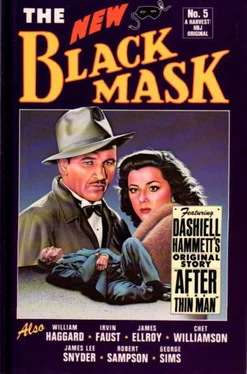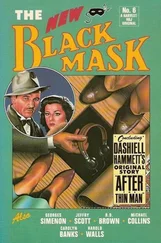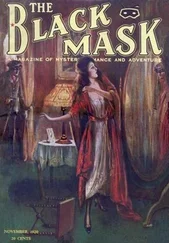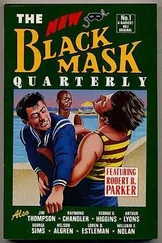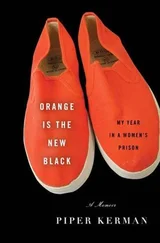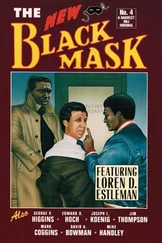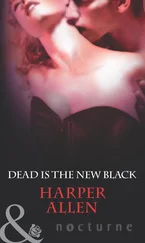William Haggard - The New Black Mask (No 5)
Здесь есть возможность читать онлайн «William Haggard - The New Black Mask (No 5)» весь текст электронной книги совершенно бесплатно (целиком полную версию без сокращений). В некоторых случаях можно слушать аудио, скачать через торрент в формате fb2 и присутствует краткое содержание. Год выпуска: 1986, ISBN: 1986, Издательство: A Harvest/HJB book Harcourt Brace Jovanovich, Жанр: Детектив, на английском языке. Описание произведения, (предисловие) а так же отзывы посетителей доступны на портале библиотеки ЛибКат.
- Название:The New Black Mask (No 5)
- Автор:
- Издательство:A Harvest/HJB book Harcourt Brace Jovanovich
- Жанр:
- Год:1986
- ISBN:9780156654845
- Рейтинг книги:4 / 5. Голосов: 1
-
Избранное:Добавить в избранное
- Отзывы:
-
Ваша оценка:
- 80
- 1
- 2
- 3
- 4
- 5
The New Black Mask (No 5): краткое содержание, описание и аннотация
Предлагаем к чтению аннотацию, описание, краткое содержание или предисловие (зависит от того, что написал сам автор книги «The New Black Mask (No 5)»). Если вы не нашли необходимую информацию о книге — напишите в комментариях, мы постараемся отыскать её.
The New Black Mask (No 5) — читать онлайн бесплатно полную книгу (весь текст) целиком
Ниже представлен текст книги, разбитый по страницам. Система сохранения места последней прочитанной страницы, позволяет с удобством читать онлайн бесплатно книгу «The New Black Mask (No 5)», без необходимости каждый раз заново искать на чём Вы остановились. Поставьте закладку, и сможете в любой момент перейти на страницу, на которой закончили чтение.
Интервал:
Закладка:
Incredulous delight lifted Piggott’s shoulders. “Tommy, my friend, you are one of a kind. You really are.”
“She loved me. We were going to get engaged.”
Piggott’s laughter poured into Tommy’s face, a stream of sound. “Son, she did a real job on you. Not that she didn’t like you. She thought you were grand. You just look here.”
He tossed the engagement photograph across the table.
He said, “I was marrying her next month, Tommy. You were just a mite late.”
“I love her,” Tommy said, looking at the photograph. His voice began breaking up. “You never did.”
The hall door came open hard, and Buddy came into the room, taking neat little steps. In his plaster face the eyes were terrible things. He called, “You, Ralston.” A silver pistol jetted from his clasped hands.
Laughter stiffened on Piggott’s face. In an unfamiliar voice, the texture of metal, he said, “Buddy, did I call…”
“I love her,” Tommy said again.
He executed a fencer’s flowing movement, an arc of graceful force that glided up the leg to the curved body to the extended right arm. His knife blade glinted as it entered Piggott’s throat. His shoulders heaved with effort as he slashed right
Incoherent noise tore from Piggott and a sudden scarlet jetting. He fell back in his chair, his expression amazed. His feet beat the floor. The chair toppled over with a heavy noise.
Gunfire, sudden, violent, repetitious, battered the room.
Tommy was slammed face forward onto the table. Papers cascaded, and a single yellow pencil spun across the pecan carpet.
The gunfire continued.
Pieces jumped out of the tabletop as Tommy’s legs collapsed. He sprawled across the table, right arm extended, body jerking.
Buddy darted forward, the revolver bright in his brown hand, concentration wrinkling his face. He fired into Tommy’s back.
Ralston shot him in the side of the head. Buddy fell over sideways and his gun, bounding across the floor, thudded against a gray filing cabinet.
Ralston whirled, knelt looked down his gunsights into the enormous hollow hole of the .45 in Elmer’s hand.
Confused shouting in the hallway.
Elmer said, white-lipped, “There’s not five-cents profit for more shooting, Ed.”
“No.”
“We’d best put the guns up.”
“All right.”
The thumping of feet behind the table had stopped.
Men poured into the room.
Ralston sucked air, roared, “I’m Ed Ralston of the Sheriff's Department. This is police business, and I want this room cleared.” He paced savagely toward them, face rigid, eyes gleaming, the horror in him intolerably bright.
Their faces glared anger, fear, shock. His voice beat at them. Elmer pushed at them, a confusion of voices and shoving bodies.
After one lifetime or two, the room emptied. Ralston shoved the gun away, said, “I’ll call the sheriff.”
“You might want to give us maybe half an hour. Some of the boys might want to fade. Give them a chance to get packed.”
“Fifteen minutes. It’ll have to be fifteen minutes.”
Elmer nodded. “See you around, Ed.”
The door closed and he was alone with the dead.
The strength leaked out of his body. He dropped into a chair and began to shake. His head blazed with pain. He could not control the shaking, which continued on and on.
Outside, engines began to roar, and he heard automobiles begin to go.
At last he wavered up on fragile legs, took a tissue from his pocket, and approached the table. Splinter-rimmed holes pocked the wood. He removed Tommy’s wallet, took thirty of the sixty-two dollars. When he replaced the wallet, the body shifted and he thought that it would slip from the table to press its tom back against him. He wrenched back, white-faced. The body did not move again.
Piggott’s wallet contained nearly six thousand dollars. Ralston removed four thousand in fifties and hundreds, counting them out slowly. He returned the wallet to a pocket the blood had not touched.
“They can both help bury her,” he said.
His voice sounded stiff and high.
“We’re all dead together,” he said. He began to laugh.
When he heard himself, he became suddenly silent. Hard rain whipped the windows.
At last, bis hand reached for the telephone.
George Sims
Family Butcher
George Sims’s suspense stories are marked by his ability to create an atmosphere in which unusual action is made convincing, as in the postcard-village setting of “Family Butcher.” The author of eleven books, Mr. Sims is a rare-book dealer in Berkshire, England.
Pasterne is arguably the prettiest village in the Hambleden Valley. Skirmett, Frieth, Fingest, and Ibstone all have their attractions as does Hambleden itself, and Turville is surmounted by a delightful windmill perched on a hilltop, a rarity indeed in the Chilterns, but Pasterne most conforms to a picture-postcard village. There is the large green, immaculately trimmed, known as Pasterne Pound, with carefully preserved oak stocks, and a dozen brick-and-flint cottages grouped round the green, just as if some Edwardian watercolourist had placed them there for a painting. The village pond is a fine example too, kept fresh by a spring, with white ducks and mallards and occasionally a nesting pair of swans. Postcards on sale in the village stores-cum-post office sell well in the summer months, particularly those featuring the pond and the rather eccentrically placed Norman church, which appears to have turned its back on Pasterne due to its being the sole relic of an even earlier settlement. But people in picture-postcard villages live lives much the same as the rest of us.
Another popular view of the village shows a northern aspect of the Pound with Daniel Patchin’s butcher shop centrally placed, together with his Pound Cottage and the copse which hides Lord Benningworth’s manor house. Patchin’s shop was originally an Elizabethan cottage; it has been a good deal refurbished over the centuries, but the exterior, apart from the small shop window, must appear much as it did originally with its massive black oak beams and the plaster walls that are freshly whitewashed each year. The name Daniel Patchin is in large white italic letters on the black facade, together with the trade description FAMILY BUTCHER in smaller capitals.
Patchin’s ancient establishment and the post office stores are the only village shops. Both are attractive and “quaint,” looking rather like the toy shops favoured by children of less-sophisticated epochs. And Patchin’s shop too is a model one, for he is fanatical about personal cleanliness and hygiene: he wears a fresh apron twice a day, and the washbasin at the rear of the shop is much used but kept spotless, as are the display area and the large bench where Patchin works, “looking more like a surgeon than a butcher,” as Lord Benningworth once described him to some friends. Patchin’s shop window always has a sparse display: a brace of pheasants, which he may well have shot himself, a hare, a local chicken or two, and one specimen of the prime meat he has for sale. Inside the shop there is a similarly small amount of meat on show: very likely just a side of Scotch beef hanging up with a Welsh shoulder of lamb. Under the impeccable refrigerated display counter there will be some of the famous Patchin sausages. Anything else that is required Daniel Patchin will have to fetch from the large cold room which takes up most of the rear portion of the shop.
The same shop when run by Daniel’s father Gabriel was well known throughout the Chilterns in the 1930s, as was Reuben Patchin’s before that. Daniel Patchin has an equally enviable reputation. Though the population of the village is not large enough to support such a thriving business, and Lord Benningworth who owns most of the village and the surrounding land is against more houses being built locally, callers come regularly from High Wycombe, Henley, and Marlow for their meat. The Patchin sausages are still made exactly as detailed in Reuben’s 1912 recipe, with generous amounts of pork, herbs, spices and freshly ground black pepper; they bear no resemblance at all to the products churned out in factories, and they attract customers from as far away as Slough and Oxford.
Читать дальшеИнтервал:
Закладка:
Похожие книги на «The New Black Mask (No 5)»
Представляем Вашему вниманию похожие книги на «The New Black Mask (No 5)» списком для выбора. Мы отобрали схожую по названию и смыслу литературу в надежде предоставить читателям больше вариантов отыскать новые, интересные, ещё непрочитанные произведения.
Обсуждение, отзывы о книге «The New Black Mask (No 5)» и просто собственные мнения читателей. Оставьте ваши комментарии, напишите, что Вы думаете о произведении, его смысле или главных героях. Укажите что конкретно понравилось, а что нет, и почему Вы так считаете.
